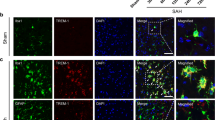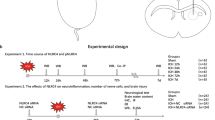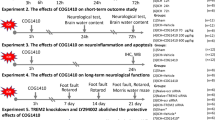Abstract
The NOD-like receptor protein 6 (NLRP6), an intracytoplasmic pattern recognition receptor in the nucleotide-binding domain, leucine-rich repeat-containing (NLR) innate immune receptor family, influences the inflammation reaction. The role of NLRP6 in cerebral ischemia-reperfusion (I/R) injury in rats is unclear. We explore the function of NLRP6 in cerebral I/R injury. The investigators used a middle cerebral artery occlusion/reperfusion model (MCAO) to imitate ischemic injury. We found the peak expression of NLRP6 is in 48-h post-cerebral I/R injury. The expression of NLRP6 siRNA, as well as the expression of protein and mRNA, was detected by Western blot and qRT-PCR. The degree of IL-1β and IL-18 was assessed by ELISA. After downregulating NLRP6, the expression of IL-1β, IL-18, cleaved Caspase-1, and myeloperoxidase (MPO) were reduced. In HE and Nissl staining, pathological injury of brain tissue after downregulating NLRP6 was improved. NLRP6 siRNA decreased the NLRP6-ASC binding states by CO-IP. NRP6 has a pro-inflammatory effect in cerebral I/R injury, which may provide a new target for the treatment of cerebral I/R injury.




Similar content being viewed by others
Abbreviations
- NLRP6:
-
NOD-like receptor protein 6
- I/R injury:
-
Ischemia-reperfusion injury
- MCAO:
-
Middle cerebral artery occlusion/reperfusion model
- siRNA:
-
Small interfering RNA
- ASC:
-
Apoptosis-associated speck-like protein containing a caspase recruitment domain
- IL-1β:
-
Interleukin-1β
- IL-18:
-
Interleukin-18
- Caspase-1:
-
Cysteinyl aspartate–specific proteinase-1
- MPO:
-
Myeloperoxidase
- qRT-PCR:
-
Reverse transcription-polymerase chain reaction
- HE staining:
-
Hematoxylin and eosin staining
- ELISA:
-
Enzyme-linked immunosorbent assay
References
Anand PK, Kanneganti TD (2013) NLRP6 in infection and inflammation. Microbes Infect 15:661–668
Anand PK, Malireddi RK, Kanneganti TD (2011) Role of the nlrp3 inflammasome in microbial infection. Front Microbiol 2:12
Chen GY, Maochang L, Fuyuan W, John B, Gabriel NE (2011) A functional role for Nlrp6 in intestinal inflammation and tumorigenesis. J Immunol 186:7187–7194
Fang L, Gao H, Zhang W, Zhang W, Wang Y (2015) Resveratrol alleviates nerve injury after cerebral ischemia and reperfusion in mice by inhibiting inflammation and apoptosis. Int J Clin Exp Med 8:3219
Franchi L, Kamada N, Nakamura Y, Burberry A, Kuffa P, Suzuki S, Shaw MH, Kim YG, Núñez G (2012) NLRC4-driven production of IL-1β discriminates between pathogenic and commensal bacteria and promotes host intestinal defense. Nat Immunol 13:449–456
He Q, Li Z, Wang Y, Hou Y, Li L, Zhao J (2017) Resveratrol alleviates cerebral ischemia/reperfusion injury in rats by inhibiting NLRP3 inflammasome activation through Sirt1-dependent autophagy induction. Int Immunopharmacol 50:208–215
Hou Y, Wang Y, He Q, Li L, Xie H, Zhao Y, Zhao J (2018) Nrf2 inhibits NLRP3 inflammasome activation through regulating Trx1/TXNIP complex in cerebral ischemia reperfusion injury. Behav Brain Res 336:32–39
Iadecola C, Alexander M (2001) Cerebral ischemia and inflammation. Curr Opin Neurol 14:89–94
Levy M, Shapiro H, Thaiss CA, Elinav E (2017) NLRP6: a multifaceted innate immune sensor. Trends Immunol 38:248–260
Li L, Xiao L, Hou Y, He Q, Zhu J, Li Y, Wu J, Zhao J, Yu S, Zhao Y (2016a) Sestrin2 silencing exacerbates cerebral ischemia/reperfusion injury by decreasing mitochondrial biogenesis through the AMPK/PGC-1α pathway in rats. Sci Rep 6:30272
Li Z, He Q, Zhai X, You Y, Li L, Hou Y, He F, Zhao Y, Zhao J (2016b) Foxo1-mediated inflammatory response after cerebral hemorrhage in rats. Neurosci Lett 629:131–136
Liu W, Liu J, Wang W, Wang Y, Ouyang X (2018) NLRP6 induces pyroptosis by activation of caspase-1 in gingival fibroblasts. J Dent Res 97:1391–1398
Longa EZ, Weinstein PR, Carlson S, Cummins R (1989) Reversible middle cerebral artery occlusion without craniectomy in rats. Stroke 20:84–91
Martinon F, Burns K, Tschopp J (2002) The inflammasome: a molecular platform triggering activation of inflammatory caspases and processing of proIL-β. Mol Cell 10:417–426
Natália KC et al (2015) IL-18 triggered by the Nlrp3 inflammasome induces host innate resistance in a pulmonary model of fungal infection. J Immunol 194:4507
Owens B (2014) Stroke Nature 510:S1
Radulovic K et al (2017) A dietary flavone confers communicable protection against colitis through NLRP6 signaling independently of inflammasome activation. Mucosal Immunol 11:mi201787
Sapkota A, Gaire BP, Cho KS, Jeon SJ, Kwon OW, Jang DS, Kim SY, Ryu JH, Choi JW (2017) Eupatilin exerts neuroprotective effects in mice with transient focal cerebral ischemia by reducing microglial activation. PLoS One 12:e0171479
Seregin SS, Golovchenko N, Schaf B, Chen J, Pudlo NA, Mitchell J, Baxter NT, Zhao L, Schloss PD, Martens EC, Eaton KA, Chen GY (2017a) NLRP6 protects Il10−/− mice from colitis by limiting colonization of Akkermansia muciniphila. Cell Rep 19:733–745
Seregin SS, Golovchenko N, Schaf B, Chen J, Eaton KA, Chen GY (2017b) NLRP6 function in inflammatory monocytes reduces susceptibility to chemically induced intestinal injury. Mucosal Immunol 10:434–445
Sun Y, Zhang M, Chen C–C, Gillilland M III, Sun X, el–Zaatari M, Huffnagle GB, Young VB, Zhang J, Hong S–C, Chang Y–M, Gumucio DL, Owyang C, Kao JY (2013) Stress-induced corticotropin-releasing hormone-mediated NLRP6 inflammasome inhibition and transmissible enteritis in mice. Gastroenterology 144:1478–1487.e1478
Szabo G, Petrasek J (2015) Inflammasome activation and function in liver disease. Nat Rev Gastroenterol Hepatol 12:387–400
Wang ZQ, Wu DC, Huang FP, Yang GY (2004) Inhibition of MEK/ERK 1/2 pathway reduces pro-inflammatory cytokine interleukin-1 expression in focal cerebral ischemia. Brain Res 996:55–66
Wang Y, Meng C, Zhang J, Wu J, Zhao J (2019) Inhibition of GSK-3β alleviates cerebral ischemia/reperfusion injury in rats by suppressing NLRP3 inflammasome activation through autophagy. Int Immunopharmacol 68:234–241
Wu X, Li L, Zhang L, Wu J, Zhou Y, Zhou Y, Zhao Y, Zhao J (2015) Inhibition of thioredoxin-1 with siRNA exacerbates apoptosis by activating the ASK1-JNK/p38 pathway in brain of a stroke model rats. Brain Res 1599:20–31
Xinag Y, Liu XW (2002) The changes of interleukin-1β in cerebral cortex and hippocampus in rats with complete brain ischemia-reperfusion injury. Mod Rehabil 6:50–51
Funding
All experiments were supported by The National Natural Science Foundation of China (Nos.81671158 and 81771261), National Youth Foundation of China (No.81701165), the Natural Science Foundation of Chongqing Science and Technology Committee, China (No.cstc2015jcyA10048).
Author information
Authors and Affiliations
Contributions
All authors had full access to all the data in the study and all are responsible for the authenticity and accuracy of experimental data. Literature search and experimental design: Changchang Meng, Jingyan Zhang, and Jing Zhao. Access to data: Changchang Meng, Jingyan Zhang, and Jing Zhao. Analysis and acquaintance of data: Changchang Meng, Jingyan Zhang, and Zhenyu Li. Drafting of the manuscript: Changchang Meng, Jingyan Zhang, Yueting Wang, and Zhenyu Li. Revision of the manuscript: Changchang Meng, Jingyan Zhang, and Yueting Wang. Statistical analysis: Changchang Meng, Jingyan Zhang, Yueting Wang, and Luyu Zhang. Sources of funds: Jing Zhao. Technical and material support: Jing Zhao and Luyu Zhang. Experimental supervision: Jing Zhao.
Corresponding author
Ethics declarations
Conflict of Interest
The authors declare that they have no competing interests.
Additional information
Publisher’s Note
Springer Nature remains neutral with regard to jurisdictional claims in published maps and institutional affiliations.
Rights and permissions
About this article
Cite this article
Meng, C., Zhang, J., Zhang, L. et al. Effects of NLRP6 in Cerebral Ischemia/Reperfusion (I/R) Injury in Rats. J Mol Neurosci 69, 411–418 (2019). https://doi.org/10.1007/s12031-019-01370-4
Received:
Accepted:
Published:
Issue Date:
DOI: https://doi.org/10.1007/s12031-019-01370-4




